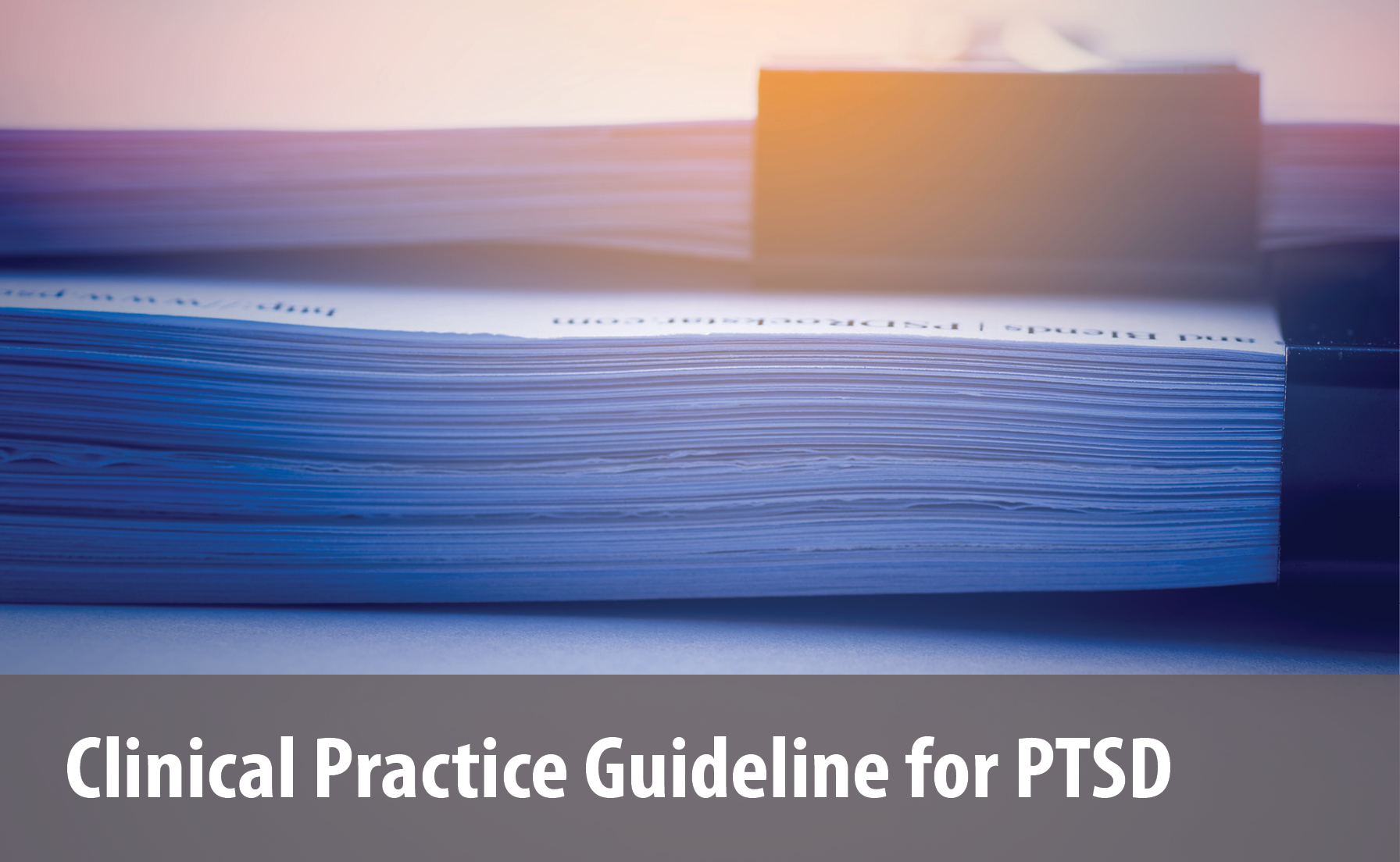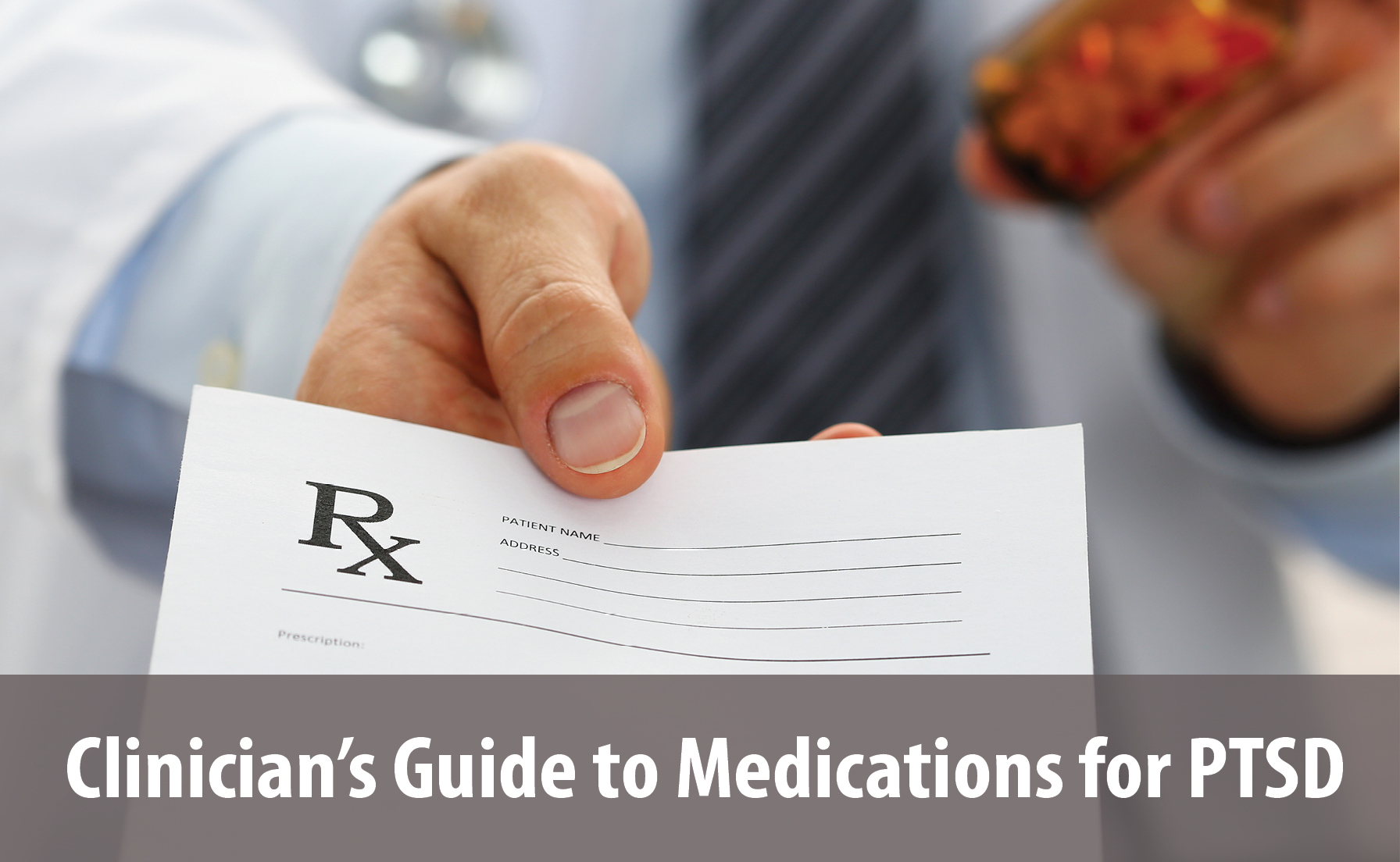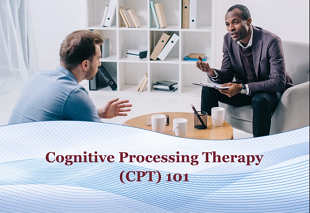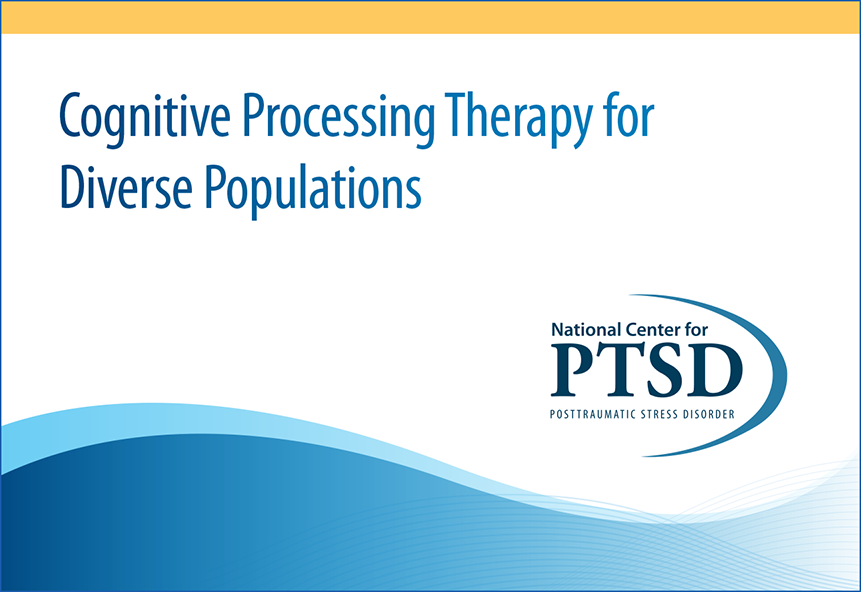PTSD: National Center for PTSD
Cognitive Processing Therapy for PTSD
Cognitive Processing Therapy for PTSD
Cognitive Processing Therapy (CPT) is a trauma-focused psychotherapy designed to treat PTSD. It is one of the most researched treatments for PTSD. A large number of studies show it is effective, including in patients with complicated presentations, such as comorbid personality disorders and other co-occurring conditions. CPT has the strongest recommendation as a treatment for PTSD in every clinical practice guideline.
Continuing Education Course
Cognitive Processing Therapy (CPT) 101
This PTSD 101 online course describes various formats and session content of Cognitive Processing Therapy.
Theoretical Model
Cognitive Processing Therapy (CPT) is based on cognitive theory (1). CPT posits that individuals organize information into schemas (categories of information) to make sense of the world, interpret new information, and exert some level of prediction and control over their experiences. Traumatic events can disrupt schemas, particularly around beliefs related to safety, trust, power, esteem, and intimacy (2). PTSD results when disruptions in these schemas manifest in inaccurate self-statements, called "stuck points," that interrupt normal recovery from the traumatic experience.
In This Article
There are 2 primary types of stuck points that can maintain PTSD according to CPT, assimilation and over-accommodation. During the process of assimilation, trauma information is altered to fit within the existing belief system. For example, if the existing belief is, "good things happen to good people and bad things happen to bad people," then a rape victim may believe that they deserved to be raped. On the other hand, the process of over-accommodation involves extreme alteration of existing belief systems based on the new trauma information (e.g., for a rape victim whose perpetrator was a man, the belief that, "all men are dangerous").
These processes stand in contrast to accommodation which involves more balanced modifications of existing belief systems to integrate the new and discrepant trauma information (e.g. "Sometimes bad things happen to good people; what I was wearing had nothing to do with causing this crime. Some people are dangerous, most are not."). The process of accommodation promotes recovery from the traumatic event. Correcting inaccurate assimilated and over-accommodated stuck points and developing more accommodated, balanced beliefs is a primary goal of CPT.
Session Content
Protocol
CPT can be administered in individual, group, or combined individual and group formats (although research suggests that the individual format is the most effective). The original CPT protocol included a detailed, written account of the traumatic event as a standard component of therapy, but later studies suggested that this therapy element was not necessary for treatment to be successful (3).
The CPT protocol now advises the therapist to allow the patient to choose whether or not to incorporate the written trauma account. Based on research pointing to the effectiveness of the cognitive component of CPT, the most recently published CPT manual (4) now describes "CPT" as the cognitive-only version of the therapy. If therapists and patients choose to add the trauma narrative to the treatment protocol, then the therapy is specified as CPT+ Account (CPT-A).
Although CPT was originally developed as a 12-session protocol, it is now administered over a variable number of sessions, depending on patient needs. This change stemmed from a study by Galovski et al. (2012) which found that ending therapy based on patient progress yielded better results than using a proscribed number of sessions—by the end of the study, 92% of the participants who had variable length CPT no longer had a diagnosis of PTSD (5).
Primary goals
The primary goal of CPT is to identify the patient's stuck points and, through cognitive restructuring, help the patient to arrive at more accurate, balanced interpretations of the event. To accomplish these treatment goals, the patient first learns cognitive restructuring through Socratic questions. The goal is to help the patient begin to challenge and modify stuck points, particularly assimilated stuck points involving self-blame, shame and hindsight bias.
Later in therapy, the patient and therapist continue to identify and challenge stuck points with particular emphasis on 5 belief systems that have been found to be disrupted after exposure to a traumatic event: safety, trust, power and control, esteem, and intimacy. Throughout the protocol, the therapist provides the patient with opportunities and encouragement to challenge stuck points outside of session with the aid of worksheets and other tools.
Overall and Relative Effectiveness
CPT is one of the most studied treatments for PTSD. There have been 34 randomized controlled trials (RCTs) where one or more of the treatment arms included CPT, with more in progress (6). Meta-analyses (e.g., 7-11) suggest that CPT produces large treatment effects in regard to PTSD symptom reduction and loss of diagnosis (e.g., 10).
CPT was originally evaluated with civilian female victims of sexual assault and rape. The first RCT of CPT compared CPT to Prolonged Exposure (PE) and to a minimal attention (MA) condition in a sample of female rape survivors, most of whom (85.8%) reported multiple traumatic events including childhood sexual assault (41%). Participants in the active treatment conditions (both CPT and PE) demonstrated significant improvement in PTSD and depression over the course of treatment as compared to the MA group. Treatment gains were maintained 5-10 years after the completion of treatment (12).
The efficacy of CPT has also been demonstrated in RCTs across diverse populations including in the Democratic Republic of Congo, Iraq and Germany (13-15). CPT has been translated into 12 languages (4), has been shown to be effective when delivered through an interpreter with Bosnian war refugees (16), and when delivered through telehealth (17).
A review by the Agency for Healthcare Research and Quality (18), which used extensive criteria for evaluating study quality, included 7 RCTs of CPT. The review concluded that there is moderate strength of evidence to support the efficacy of CPT for reduction of PTSD symptoms, depression symptoms, and loss of PTSD diagnosis and that trauma-focused therapies such as CPT are the most effective treatments for PTSD.
CPT in Clinical Practice Guidelines
CPT is recommended as a first-line treatment in all major PTSD treatment guidelines including the American Psychological Association (APA; 19), the International Society for Traumatic Stress Studies (ISTSS; 20), the United Kingdom's National Institute for Health and Care Excellence (NICE; 21), the U.S. Department of Veterans Affairs and Department of Defense (VA, DoD; 22) and the Australian Guidelines (23).
Research With Military Personnel and Veterans
Several studies have shown CPT to be effective for treating PTSD in Veterans and service members (e.g., 24). In the first RCT with U.S. Veterans, participants were randomized to either CPT or treatment as usual (25). Those participants who received CPT demonstrated significantly more improvement in PTSD symptoms, depression, anxiety, guilt and social adjustment. Forty percent of Veterans who received CPT no longer had PTSD by the end of treatment.
CPT has also been shown to be effective among Australian Veterans (26) and in a sample of U.S. Veterans who had experienced military sexual trauma (27). Two non-inferiority trials demonstrated that CPT could be delivered to male and female Veterans via tele-videoconferencing (17,28). A study with active-duty military personnel found that PTSD symptoms improved more with individual than group CPT (29).
Research With Comorbidities and Special Populations
PTSD rarely occurs in isolation and, as such, it is important that the benefits of treatment extend to individuals suffering from co-occurring disorders and conditions. To date, CPT has been shown to improve common comorbid symptoms and clinical correlates of PTSD such as depression (10), suicidal ideation (30), health-related concerns and sleep (31), physiological reactivity (32), dissociation, and functioning across important life domains (33,34).
Continuing Education Course
Cognitive Processing Therapy for Diverse Populations
This online course reviews the research conducted adapting Cognitive Processing Therapy (CPT) diverse patient populations.
CPT is efficacious with individuals who also are diagnosed with one or more personality disorders, including borderline personality disorder (35,36). Examining data from a PTSD treatment program, Kaysen et al., (2014) found that individuals with current or past histories of alcohol use disorders reported comparable outcomes in PTSD recovery as those who denied a history of alcohol use disorders (37). Several studies have shown that CPT is efficacious in treating PTSD among patients who also suffer from traumatic brain injury (TBI; 38). CPT was found to be beneficial in treating PTSD in patients with comorbid PTSD and TBI, including moderate-severe TBIs, in an 8-week residential VA treatment program (39-41).
CPT in Group Format
A few studies have examined CPT delivered in a group format. Resick et al. (2015) compared CPT delivered in group format to Present-Centered Therapy in active-duty military service members and found that participants who received CPT reported greater decreases in PTSD and depression (42). A second trial (29) conducted with active-duty service members compared group versus individually administered CPT. Participants improved significantly in PTSD and depression in both treatment conditions, but improvements in PTSD were significantly greater when the therapy was administered individually. Participants in each treatment condition benefited equally in regard to depression and suicidal ideation. These findings suggest that individual CPT is the most effective format.
Emerging Issues
Current research is focused on learning whether implementing CPT in an abbreviated period of time reduces barriers and increases access to care. A recent pilot study showed there were no differences between women who received massed CPT delivered over 5 days and those that received traditional-length CPT on PTSD or related outcomes (43). The first large-scale RCT of massed CPT delivered in a combination of group and individual format over 5 days is ongoing in an active-duty military sample (44). Overall, massed CPT studies have demonstrated that this treatment format is effective, feasible and may increase access for trauma survivors for whom committing to 12 or more weeks of treatment may be a barrier to care.
References
- Beck, A.T., Rush, A. J., Shaw, B. F., & Emery, G. (1979). Cognitive therapy of depression. New York, NY: The Guilford Press.
- McCann, I. L., Sakheim, D. K., & Abrahamson, D. J. (1988). Trauma and victimization: A model of psychological adaptation. Counseling Psychologist, 16,(4), 531-594. https://doi.org/10.1177/0011000088164002
- Resick, P. A., Galovski, T. E., Uhlmansiek, M. O., Scher, C. D., Clum, G. A., & Young-Xu, Y. (2008). A randomized clinical trial to dismantle components of Cognitive Processing Therapy for posttraumatic stress disorder in female victims of interpersonal violence. Journal of Consulting and Clinical Psychology, 76(2), 243-258. https://doi.org/10.1037/0022-006X.76.2.243
- Resick, P. A., Monson, C. M., & Chard, K. M. (2017). Cognitive processing therapy for PTSD: A comprehensive manual. New York, NY: The Guilford Press.
- Galovski, T. E., Blain, L. M., Mott, J. M., Elwood, L., & Houle, T. (2012). Manualized therapy for PTSD: Flexing the structure of Cognitive Processing Therapy. Journal of Consulting and Clinical Psychology, 80(6), 968-981. https://doi.org/10.1037/a0030600
- National Center for PTSD. (2023). PTSD Trials Standard Data Repository (PTSD-Repository) [Data set]. https://ptsd-va.data.socrata.com
- Bisson, J. I., Roberts, N. P., Andrew, M., Cooper, R., & Lewis, C. (2013). Psychological therapies for chronic post-traumatic stress disorder (PTSD) in adults. Cochrane Database of Systematic Reviews, 12, Art. No.:CD003388. https://doi.org/10.1002/14651858.CD003388.pub4
- Cusack, K., Jonas, D. E., Forneris, C. A., Wines, C., Sonis, J., Middleton, J. C., Feltner, C., Brownley, K. A., Olmsted, K. R., Greenblatt, A., Weil, A., & Gaynes, B. N. (2016). Psychological treatments for adults with posttraumatic stress disorder: A systematic review and meta-analysis. Clinical Psychology Review, 43, 128-141. https://doi.org/10.1016/j.cpr.2015.10.003
- Jonas, D. E., Cusack, K., Forneris, C. A., Wilkins, T. M., Sonis, J., Middleton, J. C., Feltner, C., Meredith, D., Cavanaugh, J., Brownley, K. A., Olmsted, K. R., Greenblatt, A., Weil, & Gaynes, B. N. (2013). Psychological and pharmacological treatments for adults with posttraumatic stress disorder (PTSD). Comparative Effectiveness Review, No. 92. (Prepared by the RTI International-University of North Carolina Evidence-based Practice Center under Contract No. 290-2007-10056-I.) AHRQ Publication No. 12-EHC011-EF. Rockville, MD: Agency for Healthcare Research and Quality; April 2013. Retrieved from: www.effectivehealthcare.ahrq.gov/reports/final.cfm
- Watts, B. V., Schnurr, P. P., Mayo, L., Young-Xu, Y., Weeks, W. B., & Friedman, M. J. (2013). Meta-analysis of the efficacy of treatments for posttraumatic stress disorder. The Journal of Clinical Psychiatry, 74(6), e541-e550. https://doi.org/10.2088/jcp.12r08225
- Jericho, B., Luo, A., & Berle, D. (2022). Trauma-focused psychotherapies for post-traumatic stress disorder: A systematic review and network meta-analysis. Acta Psychiatrica Scandinavica, 145(2), 132-155. https://doi.org/10.1111/acps.13366
- Resick, P.A., Williams, L.F., Suvak, M.K., Monson, C.M., & Gradus, J.L. (2012). Long-term outcomes of cognitive-behavioral treatments for posttraumatic stress disorder among female rape survivors. Journal of Consulting and Clinical Psychology, 80(2) 201-210. https://doi.org/10.1037/a0026602
- Bass, J. K., Annan, J., McIvor Murray, S., Kaysen, D., Griffiths, S., Cetinoglu, T., Wachter, K., Murray, L. K., & Bolton, P.A. (2013). Controlled trial of psychotherapy for Congolese survivors of sexual violence. The New England Journal of Medicine, 368, 2182-2191. https://doi.org/1-.1056/NEJMoa1211853
- Bolton, P., Bass, J.K., Zangana, G., Kamal, T., Murray, S., Kaysen, D., Lejuez, C. W., Lindgren, K., Pagoto, S., Murray, L. K., Skavenski Van Wyk, S., Ahmed, A. M. A., Amin, N. M. M., & Rosenblum, M. (2014). A randomized controlled trial of mental health interventions for survivors of systematic violence in Kurdistan, Northern Iraq. BMC Psychiatry, 14, 360. https://doi.org/10.1186/s12888-014-0360-2
- Butollo, W., Karl, R., König, J., & Rosner, R. (2016). A randomized controlled clinical trial of dialogical exposure therapy versus Cognitive Processing Therapy for adult outpatients suffering from PTSD after type I trauma in adulthood. Psychotherapy and Psychosomatics, 85, 16-26. https://doi.org/10.1159/000440726
- Schulz, P. M., Resick, P. A., Huber, L. C., & Griffin, M. G. (2006). The effectiveness of Cognitive Processing Therapy for PTSD with refugees in a community setting. Cognitive and Behavioral Practice, 13(4), 322-331. https://doi.org/10.1016/j.cbpra.2006.04.011
- Morland, L. A., Mackintosh, M. A., Greene, C. J., Rosen, C. S., Chard, K. M., Resick, P., & Frueh, B. C. (2014). Cognitive Processing Therapy for posttraumatic stress disorder delivered to rural Veterans via telemental health: A randomized noninferiority clinical trial. The Journal of Clinical Psychiatry, 75(5), 470-476. https://doi.org/10.4088/JCP.13m08842
- Forman-Hoffman, V., Middleton, J. C., Feltner, C., Gaynes B. N., Weber, R.P., Bann, C., Viswanathan, M., Lohr, K. N. & Green, J. (2018). Psychological and pharmacological treatments for adults with posttraumatic stress disorder: A systematic review update. Comparative Effectiveness Review, No. 207. (Prepared by the RTI International-University of North Carolina at Chapel Hill Evidence-based Practice Center under Contract No. 290-2015-00011-I for AHRQ and PCORI.) AHRQ Publication No. 18-EHC011-EF. PCORI Publication No. 2018-SR-01. Rockville, MD: Agency for Healthcare Research and Quality; May 2018. Retrieved from: www.effectivehealthcare.ahrq.gov/reports/final.cfm https://doi.org/10.23970/AHRQEPCCER207
- American Psychological Association (APA). (2017). Clinical practice guideline for the treatment of posttraumatic stress disorder (PTSD) in adults. Author. Retrieved from: https://www.apa.org/ptsd-guideline
- International Society for Traumatic Stress Studies (ISTSS). (2018). ISTSS PTSD prevention and treatment guidelines: Methodology and recommendations. Author. Retrieved from: http://www.istss.org/getattachment/Treating Trauma/New-ISTSS-Prevention-and-Treatment-Guidelines/ISTSS_ PreventionTreatmentGuidelines_FNL-March-19-2019.pdf.aspx
- National Institute for Health Care Excellence (NICE). (2018). Guideline for post-traumatic stress disorder. National Institute for Health and Clinical Practice. Retrieved from: https://www.nice.org.uk/guidance/ng116/chapter/Recommendations
- Departments of Veterans Affairs and Defense (VA/DoD). (2023). VA/DoD clinical practice guideline for the management of posttraumatic stress disorder and acute stress disorder. Author. Retrieved from: https://www.healthquality.va.gov/guidelines/MH/ptsd/
- Phoenix Australia Centre for Posttraumatic Mental Health. (2021). Australian guidelines for the prevention and treatment of acute stress disorder, posttraumatic stress disorder and Complex PTSD. Australian Government, National Health and Medical Research Council. Retrieved from: https://www.phoenixaustralia.org/australian-guidelines-for-ptsd/
- Schnurr, P. P., Chard, K. M., Ruzek, J. I., Chow, B. K., Resick, P. A., Foa, E. B., Marx, B. P., Friedman, M. J., Bovin, M. J., Caudle, K. L., Castillo, D., Curry, K. T., Hollifield, M., Huang, G. D., Chee, C. L., Astin, M. C., Dickstein, B., Renner, K., Clancy, C. P., Collie, C., Maieritsch, K., Bailey, S., Thompson, K., Messina, M., Franklin, L., Lindley, S., Kattar, K., Leudtke, B., Romesser, J., McQuaid, J., Sylvers, P., Varkovitzky, R., Davis, L., MacVicar, D., & Shih, M. C. (2022). Comparison of Prolonged Exposure vs Cognitive Processing Therapy for treatment of posttraumatic stress disorder among US Veterans. JAMA Network Open, 5(1), e2136921. https://doi.org/jamanetworkopen.2021.36921
- Monson, C. M., Schnurr, P. P., Resick, P. A., Friedman, M. J., Young-Xu, Y., & Stevens, S. P. (2006). Cognitive Processing Therapy for Veterans with military-related posttraumatic stress disorder. Journal of Consulting and Clinical Psychology, 74(5), 898-907. https://doi.org/10.1037/0022-006X.74.5.898
- Forbes, D., Lloyd, D., Nixon, R.D.V., Elliott, P., Varker, T., Perry, D., Bryant, R. A., & Creamer, M. (2012). A multisite randomized controlled effectiveness trial of Cognitive Processing Therapy for military-related posttraumatic stress disorder. Journal of Anxiety Disorders, 26(3), 442-452. https://doi.org/10.1016/j.janxdis.2012.01.006
- Surís, A., Link-Malcolm, J., Chard, K., Ahn, C. & North, C. (2013). A randomized clinical trial of Cognitive Processing Therapy for Veterans with PTSD related to military sexual trauma. Journal of Traumatic Stress, 26(1), 28-37. https://doi.org/10.1002/jts.21765
- Morland, L. A., Mackintosh, M. A., Rosen, C. S., Willis, W., Resick, P. A., Chard, K., & Frueh, B. C. (2015). Telemedicine versus in-person delivery of Cognitive Processing Therapy for women with posttraumatic stress disorder: A randomized noninferiority trial. Depression and Anxiety, 32(11), 811-820. https://doi.org/10.1002/da.22397
- Resick, P. A., Schuster Wachen, J., Dondanville, K. A., Pruiksma, K. E., Yarvis, J. S., Peterson, A. L., Mintz, J. & the STRONG STAR Consortium. (2017). Effect of group versus individual Cognitive processing therapy in active-duty military seeking treatment for posttraumatic stress disorder: A randomized clinical trial. JAMA Psychiatry, 74(1), 28-36. https://doi.org/10.1001/jamapsychiatry.2016.2729
- Gradus, J. L., Suvak, M. K., Wisco, B. E., Marx, B. P., & Resick, P. A. (2013). Treatment of posttraumatic stress disorder reduces suicidal ideation. Depression and Anxiety, 30(10), 1046-1053. https://doi.org/10.1002/da.22117
- Galovski, T. E., Monson, C., Bruce, S. E., & Resick, P. A. (2009). Does cognitive-behavioral therapy for PTSD improve perceived health and sleep impairment? Journal of Traumatic Stress, 22(3), 197-204. https://doi.org/10.1002/jts.20418
- Griffin, M. G., Resick, P. A. & Galovski, T. E. (2012). Does physiologic response to loud tones change following cognitive-behavioral treatment for posttraumatic stress disorder? Journal of Traumatic Stress, 25(1) 25-32. https://doi.org/10.1002/jts.21667
- Galovski, T. E., Sobel, A. A., Phipps, K. A., & Resick, P. A. (2005). Trauma recovery: Beyond posttraumatic stress disorder and other Axis I symptom severity. In T. A. Corales. Trends in posttraumatic stress disorder research. (pp. 207-227). Hauppauge, NY: Nova Science Publishers, Inc.
- Monson, C. M., Macdonald, A., Vorstenbosch, V., Shnaider, P., Goldstein, E. S. R., Ferrier-Auerbach, A. G. & Mocciola, K. E. (2012). Changes in social adjustment with Cognitive Processing Therapy: Effects of treatment and association with PTSD symptom change. Journal of Traumatic Stress, 25(5), 519-526. https://doi.org/10.1002/jts.21735
- Clarke, S. B., Rizvi, S. L., & Resick, P. A. (2008). Borderline personality characteristics and treatment outcome in cognitive-behavioral treatments for PTSD in female rape victims. Behavior Therapy, 39(1), 72-78. https://doi.org/10.1016/j.beth.2007.05.002
- Farmer, C. C., Mitchell, K. S., Parker-Guilbert, K. & Galovski, T. E. (2017). Fidelity to the Cognitive Processing Therapy protocol: Evaluation of critical elements. Behavior Therapy, 48(2), 195-206. https://doi.org/10.1016/j.beth.2016.02.009
- Kaysen, D., Schumm, J., Pedersen, E. R., Seim, R. W., Bedard-Gilligan, M., & Chard, K. (2014). Cognitive Processing Therapy for Veterans with comorbid PTSD and alcohol use disorders. Addictive Behaviors, 39(2), 420-427. https://doi.org/10.1016/j.addbeh.2013.08.016
- Jak, A. J., Jurick, S. M., Crocker, L. D., Sanderson-Cimino, M., Aupperle, R., Rodgers, C.S., Thomas, K. R., Boyd, B., Norman, S. B., Lang, A. J., Keller, A. V., Schiehser, D. M., & Twamley, E. W. (2019). SMART-CPT treatment for Veterans with comorbid posttraumatic stress disorder and history of traumatic brain injury: A randomised controlled trial. Journal of Neurology, Neurosurgery, and Psychiatry, 90(3), 333-341. https://doi.org/10.1136/jnnp-2018-319315
- Chard, K. M., Schumm, J., McIlvain, S., Bailey, G., & Parkinson, R. (2011). Exploring the efficacy of a residential treatment program incorporating Cognitive Processing Therapy-Cognitive for Veterans with PTSD and traumatic brain injury. Journal of Traumatic Stress, 24(3), 347-351. https://doi.org/10.1002/jts.20644
- Walter, K. H., Barnes, S. M., & Chard, K. M. (2012). The influence of MDD on residential treatment outcome among veterans with PTSD and a history of TBI. Journal of Traumatic Stress, 25(4), 426-432. https://doi.org/10.1002/jts.21722
- Walter, K. H., Dickstein, B. D., Barnes, S. M., & Chard, K. M. (2014). Comparing effectiveness of CPT to CPT-C among U.S. Veterans in an interdisciplinary residential PTSD/TBI treatment program. Journal of Traumatic Stress, 27, 438-445. https://doi.org/10.1002/jts.21934.
- Resick, P. A., Wachen, J. S., Mintz, J., Young-McCaughan, S., Roache, J. D., Borah, A. M., Dondanville, K. A., Hembree, E. A., Litz, B. T., & Peterson, A. L. (2015). A randomized clinical trial of group Cognitive Processing Therapy compared with group present-centered therapy for PTSD among active duty military personnel. Journal of Consulting and Clinical Psychology, 83(6), 1058-1068. https://doi.org/1-.1037/ccp0000016
- Galovski, T. E., Werner, K. B. Weaver, K., Morris, K. A., Nanney, J., Wamser-Nanney, R., McGlinchey, G. Fortier, C. B., & Iverson, K. M. (2021). Massed Cognitive Processing Therapy for posttraumatic stress disorder in women survivors of intimate partner violence. Psychological Trauma: Theory, Research, Practice, and Policy. Online first publication. https://doi.org/10.1037/tra00001100
- Wachen, J. S., Morris, K., Galovski, T. E., Dondanville, K., & Resick, P. (2019, November). Massed Cognitive Processing Therapy in active duty military: Design of a randomized clinical trial. [Poster presentation]. Annual Meeting of the International Society for Traumatic Stress Studies, Boston, MA.
You May Also Be Interested In

VA/DoD Clinical Practice Guideline for PTSD (2023)
Get information on evidence-based treatment recommendations for PTSD.

Clinician's Guide to Medications for PTSD
Get key information and guidance on the best medications for PTSD.


























